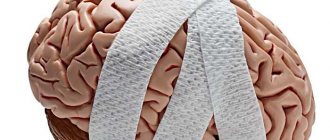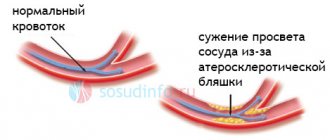A heavy head is a common symptom of injuries and diseases of the brain, spinal and cervical spine, as well as diseases of the respiratory and cardiovascular systems. Correction of sleep patterns, nutrition and massage will help relieve heaviness in the head caused by stress, lack of sleep and an inactive lifestyle. But if the source of the manifestation is a disease, then you cannot do without medication.
You should not joke with the symptoms of a heavy head, because it may be a signal of the presence of serious diseases of the spine or brain
Causes of heaviness in the head
Heavy head syndrome manifests itself in people as follows:
- feeling of fullness, swelling of the head;
- sensation of cotton wool or stones inside the skull;
- severe drowsiness, lethargy, fatigue;
- lethargy, problems with concentration;
- clouding and confusion of consciousness.
The causes of this condition can be stress and overwork, poor diet and bad habits, brain diseases and VSD.
Possible diseases
“Cotton head” occurs due to diseases of the brain, ENT organs, cardiovascular and musculoskeletal systems of the body, as well as as a result of injuries.
Diseases of the brain and ENT organs can cause cotton head
| Inflammatory diseases of the ENT organs | The inflammatory process in the body is accompanied by increased temperature, severe drowsiness and other unpleasant sensations: pain in the head, heaviness, buzzing. |
| Meniere's syndrome | When the fluid pressure in the ears increases, the signals sent to the brain are distorted and disrupt the body's functioning. The patient experiences stuffy ears, headaches, ringing and heaviness inside the head, problems with coordination, drowsiness and nausea. |
| Meningitis | Infection of the membranes of the brain is accompanied by fever, nausea and heaviness in the head. The pain squeezes the head as if in a vice, the patient wants to sleep. |
| Migraine | A disease characterized by severe pain on one side of the head and accompanying symptoms. With a migraine, the head seems to swell from the inside, ringing and photophobia occur, blood pressure decreases, and the patient feels nauseous. |
| Increased intracranial pressure | Intracranial pressure pathologies are common in children. They are manifested by a feeling of heaviness inside the head, bursting pain in the occipital region, dizziness, general weakness of the body and severe nausea. |
| Ischemic or hemorrhagic stroke | Heaviness of the head can appear on the eve of a stroke, and also as a residual symptom. Other symptoms of the disease include pain and noise in the head, sudden surges in blood pressure. |
| Pathologies of the nerve ganglion | Inflammatory processes and tumors in the nerve ganglion distort signals transmitted from organs to the brain. This provokes the appearance of heaviness in the head, dizziness, and vomiting. |
| Head neoplasms | Cancerous tumors of the brain, eye and ear are accompanied by a bursting feeling inside the head. Other symptoms include hearing and vision problems, headaches, weakness and dizziness. Coordination of movements may be impaired: the gait becomes unsteady, the person moves as if drunk. |
| Bronchial asthma | During asthmatic attacks, acute hypoxia of the brain occurs. It manifests itself as pressure inside the head, severe headaches, and dizziness. |
| Pathologies of the cardiovascular system | High and low blood pressure is characterized by severe symptoms: headaches, heaviness and noise in the head, dizziness, lethargy. With normal pressure, heaviness in the head signals a disturbance in the heart rhythm: arrhythmia, angina. |
| Osteochondrosis, spondylosis | With osteochondrosis and spondylosis of the cervical spine, compression of the vertebral artery and impaired cerebral circulation occurs. This provokes brain hypoxia, causing heaviness, pain and ringing in the head, as well as dizziness. |
| Cervical myositis | When the neck muscles become inflamed, muscle tone increases, which causes worsening of cerebral circulation. Pain sensations radiate to the back of the head, pressure occurs inside the skull, and a feeling of a head that cannot be lifted. |
| Vegetative-vascular dystonia | Violation of vascular tone in the brain, which manifests itself in VSD, impairs cerebral circulation and provokes hypoxia. This can manifest itself as heaviness in the head, pain, dizziness, panic attacks, increased heart rate, lethargy and lethargy. |
| Depression | Clinical depression may be accompanied by constant severity and other unpleasant sensations: headache, noise in the head and skull, sleep disturbances. |
| Head and cervical spine injuries | Fractures and cracks of the skull, concussions, bruises of the neck and head, injuries to the middle ear and eardrum are accompanied by unpleasant symptoms: dizziness, the skull seems to be pressing on the brain, a headache envelops the head, severe nausea and vomiting occur. |
Other factors
Other causes of heaviness in the head that are not caused by disease include:
- Stressful state. With overexertion, neuroses, pain occurs in the head, accompanied by heaviness. The skull is compressed like a hoop, and an intense dull pain appears.
- Sleeping in an awkward position. The unnatural position of the head and neck during sleep impedes cerebral circulation. This leads to hypoxia, causing a pressing sensation and pain inside the head.
- Sedentary lifestyle . Lack of sports exercises reduces muscle tone. This provokes muscle overstrain during light loads, which can cause osteochondrosis and cause heaviness in the head.
- Sitting at the computer for a long time. Overfatigue of the body, supplemented by prolonged sitting in an uncomfortable position, causes overstrain of the muscles of the back and neck. This leads to heaviness and pain in the head.
- Sleep problems. Chronic lack of sleep and insomnia impair the functioning of the body and reduce brain activity. In the morning, there is drowsiness and heaviness in the skull, the head cannot think straight, and headaches may appear.
- Orthodontic problems. With an incorrect bite and unsuitable size and shape of dentures, subluxation of the jaw joint occurs. In addition to jaw crunching, this causes an incomprehensible condition: heaviness inside the head, lethargy, pain.
- Meteor dependence. People sensitive to changes in atmospheric pressure feel discomfort during sudden weather changes. It can manifest itself as heaviness and buzzing in the head, pressure surges, and vascular spasms.
- Pregnancy. Due to hormonal changes during pregnancy, unpleasant symptoms occur: headaches, a bursting feeling in the skull, dizziness, weakness and lethargy.
- Allergic reactions. Severe allergies can provoke swelling of the brain, as well as an attack of suffocation, which impairs cerebral circulation. This is manifested by heaviness and pain in the head, dizziness, and loss of coordination.
- Toxic poisoning. Food, drug, alcohol, nicotine and drug intoxication causes oxygen starvation of the brain. It is accompanied by distension of the skull, pain, and dizziness.
Dependence on weather conditions is one of the most common causes of heaviness in the head.
Comprehensive diagnostics
If fogginess in the head appears constantly, then this is a reason to urgently consult a doctor. Therapists, neurologists, and psychotherapists deal with this issue.
Before prescribing treatment, the doctor must interview the patient and find out what additional symptoms he has, as well as conduct a diagnosis. Here is a list of mandatory tests needed to find out why fuzzy head syndrome occurs:
- General analysis of urine and blood. Exclude the presence of inflammatory reactions and infectious processes.
- Ultrasound of blood vessels in the cervical spine.
- CT or MRI of the spine and brain. An MRI and CT scan will allow you to exclude malignant processes, determine the condition of blood vessels, identify the presence of chronic diseases of the nervous system, etc.
- Angiography of cerebral vessels.
The patient may also need to consult other specialists.
If a person experiences a feeling of foggy consciousness, often has a unclear head, or headaches, it is necessary to visit a neurologist. It is this specialist who, after examining the patient and listening to his complaints, suggests undergoing additional examination or refers him to a specialist. Possible diagnostic methods:
- Ultrasound of the vessels of the head and neck.
- Angiography of cerebral vessels.
- CT and MRI of the head, cervical spine.
If the development of astheno-neurasthenic syndrome is suspected, the person will be referred to see a psychotherapist. If circulatory disorders are caused by neurasthenia, the patient may additionally be advised to undergo rheoencephalography.
Which doctor should I contact?
If you experience headaches, you should consult a general practitioner. The therapist will conduct an examination, perform diagnostics and determine a preliminary diagnosis.
Depending on the suspected cause of severity, consultation with doctors will be required:
- ENT: infectious diseases of the ENT organs, Meniere's disease.
- Neurologist: osteochondrosis, VSD, migraine, stroke.
- Allergist: allergic reactions with cerebral edema.
- Cardiologist: pathologies of the cardiovascular system.
- Angiologist: cerebral aneurysm.
- Narcologist: drug and alcohol addiction.
- Psychologist: stress, neurotic conditions, overwork.
- Oncologist: neoplasms of the eye, middle ear, brain.
Heaviness in the head can be the cause of many pathologies, so you will have to see a lot of different doctors
For cotton head in children, you should consult a pediatrician and family doctor.
What to do if you have a heavy head?
The following measures will help you cope with the bursting feeling inside your head:
- Cool or contrast shower, taken for at least 15-20 minutes.
- Light massage and self-massage of the occipital and temporal areas of the head, as well as the neck.
- Performing exercises to relieve heaviness in the head: tilting the head, rotating the neck.
- Long and sound sleep in a quiet, dark, cool room.
- Drink at least 2 liters of still mineral water.
- Diet correction: eliminating fatty and fried foods, adding vegetables.
- Purchase of orthopedic sleep accessories: mattress, pillow.
Manual therapy and physiotherapeutic procedures will also help in treatment: electrophoresis, iontophoresis, magnetic therapy.
Medicines for severe headaches
To treat heaviness in the head, anti-inflammatory drugs, analgesics and NSAIDs, sedatives and vascular drugs are used.
For prevention, you can take sedatives, since heaviness often occurs due to stress.
| Group of drugs | Effect on heavy head syndrome | Examples of funds |
| Antibacterial drugs | They destroy pathogenic bacteria and are used for bacterial inflammatory processes in the body. | Amoxicillin, Lexin, Sumamed |
| Antiviral agents | They inhibit the replication of viral DNA and are used for viral infections: influenza, meningitis, ENT infections. | Tamiflu, Amandandine |
| Nonsteroidal anti-inflammatory drugs | Relieves inflammatory syndrome, relieves heat and pain in the head, back and neck. | Diclofenac, Ibuprofen, Ketorol |
| Antimigraine drugs | Relieves symptoms of migraine: headache, heaviness and noise in the head, photophobia, nausea and vomiting. | Rapided, Relpax |
| Vasodilators | Restore blood circulation, dilate blood vessels in the brain. Used for atherosclerosis and hypertension. | Nitroglycerin, Lipoford, Mefacor |
| Antihypertensive drugs | Relieves heaviness in the head that occurs with high blood pressure. | Furosemide, Reserpine, Methyldopa |
| Potassium antagonists | They increase the tone of arteries and blood vessels, improve cerebral circulation and metabolism in the head. | Nimodipine, Lomir, Cinnarizine |
| Nootropic drugs | They improve metabolic processes in the head, normalize cerebral circulation, and strengthen neural connections. | Picamilon, Glycine, Nootropil |
| Muscle relaxants | They relax the muscles, relieve the increased tone of the muscles of the back and neck, which causes heaviness and pain. | |
| Tranquilizers | Relaxes the nervous system, relieves symptoms of stress, depression, and panic. | Amizil, Phenazepam, Buspirone |
| Sleeping pills | Helps normalize sleep in case of chronic lack of sleep and insomnia. | Zolpidem, Nozepam, Diazepam |
| Sedatives | Relieves nervous tension and fatigue. Used for stress and neuroses that cause heaviness. | Novo-passit, Valerian, Persen |
| Antihistamines | Used for allergic reactions that provoke swelling of the brain and heaviness in the head. | Diazolin, Suprastin |
| Vitamins and minerals | Strengthen the walls of blood vessels, saturate the body with useful micro-, macroelements and vitamins, improve blood circulation. | Ascorutin, Blueberry Forte, Alphabet |
Methods for treating cotton head
For osteochondrosis, the patient is prescribed complex treatment. It includes taking medications:
- For pain relief - non-steroidal anti-inflammatory drugs.
- To normalize blood flow - nootropic, vasotropic drugs.
- Locally - gels based on Diclofenac, Ketoprofen to relieve inflammation and reduce pressure on the vertebral artery.
Physiotherapy is also indicated for patients: electrophoresis on the cervical spine, massage, manual therapy.
If a patient complains that he does not have clarity in his head, there is a constant feeling of confusion, vagueness, heaviness, and he is diagnosed with neurasthenia, treatment can take a long time.
First of all, you need to eliminate the factors that provoke the development of discomfort:
- Reduce mental, mental, physical stress.
- Get enough sleep, sleep at least 8 hours a day.
- Normalize the work and rest schedule.
- Relieve yourself of some responsibility.
- Eat properly.
Rational psychotherapy is carried out with patients, and autogenic training is also indicated for such patients. Medicines used for treatment:
- Tranquilizers.
- Antidepressants.
- Hypnotic.
- Medicines that have a strengthening effect on blood vessels.
- Vitamins that normalize the functioning of the body.
Increasing immunity, regular walks in the fresh air, and dosed physical activity (swimming, cycling, running) help reduce discomfort.
Many people still experience brain fog once treatment is stopped. Sometimes “being sick” is a way to hide from problems that cannot be resolved. Find the problem with a psychotherapist and fix it. If you can’t do this, you just need to radically change your life: change jobs, decide to vacation in a distant country, forgive all insults.











